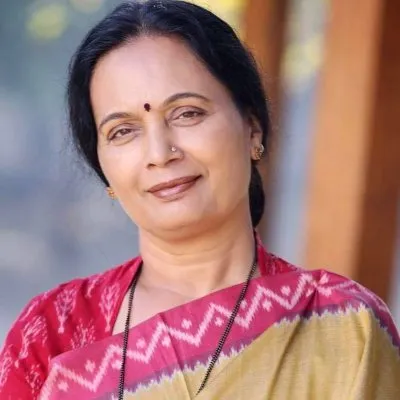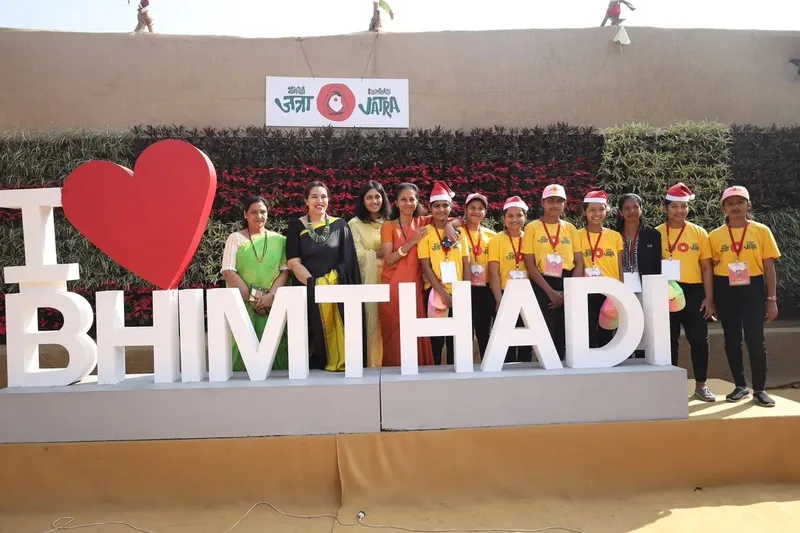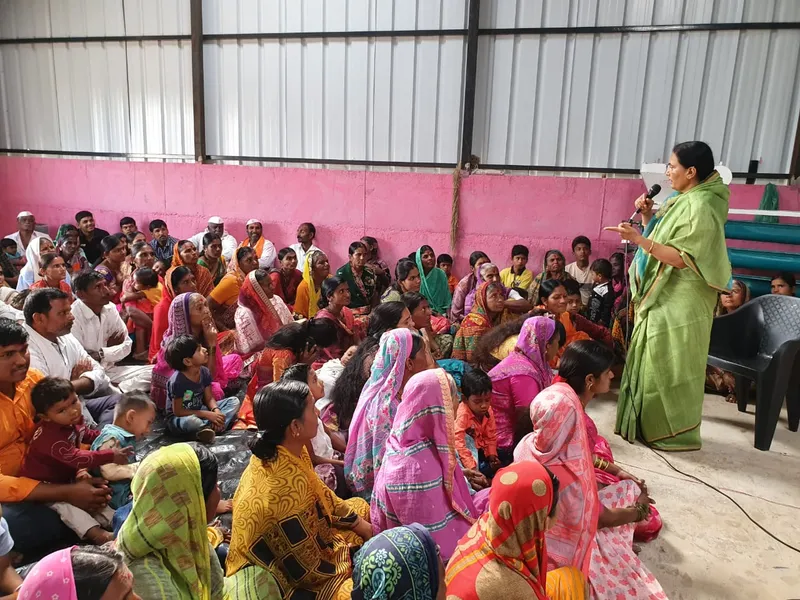Women’s rights activist Sunanda Pawar on uplifting women in rural Maharashtra
From forming a self-help group, promoting menstrual hygiene among girls, and empowering rural women entrepreneurs, to water conservation, Sunanda Pawar has been a catalyst for change.
For over two decades now, Sunanda Pawar has been visiting women in rural Maharashtra to engage them in conversations and empower them.
Pawar motivates these women to become financially independent, and also emphasises on the importance of maintaining good health and hygiene, inspiring them to take charge of their well-being.
A philanthropist and women’s rights activist, 64-year-old Sunanda Pawar has been consistently working to uplift rural communities, with a special focus on women.
From forming a self-help group (SHG), promoting menstrual hygiene among girls, and empowering rural women entrepreneurs, to water conservation, Pawar has been a catalyst for change.
“Women in rural Maharashtra do not have proper education or financial independence. I wish to see them stand up on their feet and be able to take care of themselves in every way possible,” she tells HerStory.
Lessons from life
Hailing from a humble farming background, Sunanda Pawar had a close view of the challenges faced by women in rural communities–ranging from lack of education and early marriage to financial dependency.
Pawar got married to Rajendra Dinkar Pawar and settled in Baramati, Maharashtra. Her father-in law, Appasaheb Pawar, was a social revolutionist and one of the founders of the Agricultural Development Trust, which was started in 1971. The Trust was started in response to the agricultural challenges faced in the Baramati region, including water scarcity and a need for sustainable farming practices. It aimed to transform barren lands, promote modern agricultural techniques, and address broader community development issues.
After marriage, Pawar got busy with family responsibilities. And as her two children grew up, her father-in-law motivated her to work.
Appasaheb Pawar noticed that farmers in Sharda Nagar would not send their girls to schools in far-off places due to safety concerns, and this brought down the literacy rate of girl children in the area.

Sunanda Pawar ( Credit: X)
To address the issue, he established a residential educational complex exclusively for girls. It started with a college for women in 1989. Along with this, he started a primary school, a secondary school, Shardabai Pawar College for women, Arts Teacher Diploma College, D.Ed. College, Nursing College, and hostels with a capacity for eight hundred girls in Sharda Nagar in Malegaon, Baramati, Maharashtra
As Appasaheb Pawar could not talk to girls about their personal concerns, he encouraged Pawar to offer a helping hand, and soon, Pawar started managing hostel operations and addressing the concerns of girls.
After the demise of her father-in-law in 2000, Pawar and her husband Rajendra Pawar held the reins of the trust.
All for women
While managing the hostel, Pawar got to interact with many mothers and found they were unaware of the government schemes available for women.
Therefore, she decided to start Sharda Mahila Sangh, a SHG consisting of 15,000 women in Baramati. Under this, she informed them about the different state government schemes available for women. Additionally, she helped these women in applying for the same as well.
As part of the SHG, women received training in fundamental entrepreneurship concepts. They were also advised on what products they can produce, about packaging, and other effective selling techniques.
However, they did not have a platform to sell their products. Pawar started the Bhimthadi Jatra, a cultural carnival, to provide women entrepreneurs a platform to showcase their products like artifacts, jewellery, bangles, homemade food items, and more.
“We wanted to be the connecting rope between these women entrepreneurs and buyers,” she says.
She adds that the participants are allowed to set up stalls after carefully checking all products, licenses, and certifications. While they don't impose a stall cost or seek sponsors for women from below the poverty line, a nominal fee is charged for those above it.

Bhimthadi Jatra is a cultural carnival for women entrepreneurs to showcase their products (Credit: Sunanda Pawar / X)
Smitha Solaskar, who runs a company called Homemade Masala, came to know about this festival ten years ago.
“Sunanda Pawar provided me with guidance on how I can improve my product and its packaging. Moreover, the festival gave me a platform to showcase my products to a larger audience,” she explains.
Pawar further says that in rural India, parents get the girls married off at an early age, and do not let them study 12th standard.
So, when a police officer friend in Baramati suggested Pawar to train young girls to clear the police examination and join the police force, she launched a police training programme in 2016 to help rural girls in Maharashtra. The six-month-long training programme is for free and encompasses theoretical and practical training.
As of now, more than 800 young women have been trained, and 400 girls have been selected in law enforcement in Maharashtra. In 2023, around 87 girls joined the police force in Maharashtra after enrolling in the police training programme.
Promoting women’s health and hygiene
While engaging with young girls and women, Pawar observed that many women used cloth during their menstrual cycles, and were unaware of the potential health problems associated with this practice.
To solve this, she started conducting awareness sessions on menstrual hygiene in schools and colleges. In addition to these sessions, her team of seven members also distribute Sobati, a biodegradable sanitary napkin. So far, they have provided pads to 2,50,000 girls.
Pawar recalls that a company also donated an automatic pad-making machine, which was being used by the women of SHG to produce sanitary napkins.
“Every year we go to schools and colleges and show an animated movie to dissipate knowledge about menstrual hygiene and good touch-bad touch,” she adds.

(Credit: Sunanda Pawar / X)
Pawar’s efforts do not stop at menstrual hygiene, they extend to setting up health camps for women as well as she lost her mother and younger sister to cancer.
Her team conducts yearly health check-ups, provides free surgeries, and offers cancer treatments specifically for women. Additionally, they extend their services to children with squint eyes, facilitating eye surgeries. Their partnerships with a few selected hospitals in Maharashtra ensure access to these specialised treatments.
Apart from this, Pawar has also passionately carried forward the legacy of water conservation established by Appasaheb Pawar 50 years ago. She oversees initiatives such as water conservation in more than 50 villages in Baramati, Indapur, and Purandar.
Challenges and future
Pawar’s journey has not been an easy one. She says the biggest challenge in her way was the lack of knowledge among women.
“They lack awareness about events beyond their homes or villages. Motivating them to engage and stay informed posed a significant challenge,” she adds.
In addition, she highlights another challenge—‘women pulling down women’.
She recounts a situation where a woman bore five daughters because her mother-in-law desired a son, but the family did not consider how it would manage to care for all five children.
But despite these challenges, Pawar has always stood her ground.
Talking about future projects, Pawar highlights that to date many schools do not have a proper toilet for girls or a separate space where they can change their sanitary napkins.
Moreover, she says that many girls do not drink water throughout the day in school because of the absence of a toilet. For this, Pawar plans to start working towards constructing new toilets for girls in schools.
Pawar is dedicated to sharing her knowledge and helping rural women. After having worked for women’s upliftment for many years, she wants to continue this work in the years to come.
“There are numerous educated women in urban areas, and I urge them to step forward, share their knowledge with rural women, and extend a helping hand in empowering them,” she says.
Edited by Megha Reddy







